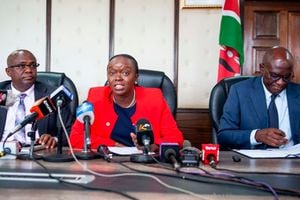Crisis as 600 private hospitals threaten to suspend SHA services over Sh30bn arrears

Dr Brian Lishenga (centre), Chairman of the Rural and Urban Private Hospitals Association of Kenya (Rupha) leading his members in addressing journalists in the past.
More than 600 hospitals affiliated to the Rural and Urban Private Hospitals Association in Kenya (Rupha) will suspend all Social Health Authority services in their facilities from Monday February 24.
This even as the government scrambles to address their concerns over unpaid dues.
The association claims they are owed about Sh30 billion in arrears from the defunct National Health Insurance Fund (NHIF), with debts dating from 2017 to the time of transition to SHA.
Dr Brian Lishenga, the association's chairperson, told journalists on Wednesday that the decision stems from unpaid government dues and an ineffective outpatient reimbursement system under SHA.
“As healthcare professionals, our first duty is the welfare of our patients. However, the continued failure to address critical challenges in the SHA transition is now directly endangering the quality and sustainability of care in our hospitals,” said Dr Lishenga.
“This decision has not been made lightly. It follows months of failed engagements, unfulfilled promises, and growing financial distress among hospitals, which now threatens the very survival of healthcare institutions across Kenya,” he added.
The association members through their leaders said that they have failed to reach a consensus with the government on two critical issues: unpaid arrears and the troubling SHA outpatient model.
“This model is a direct threat to patient safety, forcing hospitals into cost-cutting measures that will compromise the quality of healthcare. We refuse to put Kenyan lives at risk,” he said.
Medical Services Principal Secretary Dr Harry Kimtai confirmed receiving Rupha's notice of service suspension, and said that the ministry has directed SHA to conduct an audit of all claims.
"We stopped services under former NHIF and now we are providing service under SHA. We need to know the exact amount that each facility is owed. This exercise has been undertaken and we expect a report to determine how much the government owes the facilities, after which we will develop a payment program,” Dr Kimtai on the sidelines of the Nation Digital Summit in Diani, Kwale County.
However, Dr Lishenga maintains the situation has become untenable.
"The consequences have been dire, resulting in massive job losses, bank defaults, stock-outs of essential medicines, unpaid specialist doctors as well as tax burden on non-existent income," he said.
A major point of contention is SHA's outpatient reimbursement rate.
"It is unrealistic for the government to pay only Sh75 for every patient in a month. This model is a direct threat to patient safety, forcing hospitals into cost-cutting measures that will compromise the quality of healthcare. We refuse to put Kenyan lives at risk," said Dr Lishenga.
The crisis comes as Deputy President Prof Kithure Kindiki recently acknowledged the need to address SHA's challenges.
Prof Kindiki has given Health ministry officials until the end of this month to resolve SHA issues before launching a nationwide registration campaign.
Health Cabinet secretary Dr Deborah Mulongo also said that the government has now established the Benefits Package and Tariffs Advisory Panel whose mandate will be to review the benefit packages after every two years.
The outpatient package that Dr Lishenga and team are grumbling over has not been considered in the reviews that were spelled out earlier this week in a consultative meeting at the deputy president’s residence in Karen.
Dr Lishenga also reiterated that they have not backed down from their earlier statement on discontinuing their service to teachers and police officers under the Medical Administrator Kenya Limited (MAKL).
“MAKL has failed to pay hospitals for over 11 months. It has also forced hospitals to accept arbitrary and unexplained discounts and it favored its own clinics in an uncompetitive and unethical manner,” said Dr Lishenga.
“Without urgent government intervention, teachers and police officers will be left without quality healthcare services, further straining public hospitals already at breaking point,” he added.





